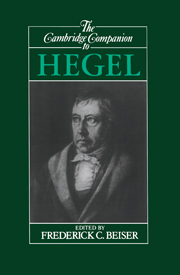Book contents
- Frontmatter
- Introduction
- 1 Hegel's intellectual development to 1807
- 2 You Can't Get There from Here
- 3 Hegel's conception of logic
- 4 Hegel's idealism
- 5 Hegel's dialectical method
- 6 Thought and being
- 7 Hegel's ethics
- 8 The basic context and structure of Hegel's Philosophy of Right
- 9 Hegel's historicism
- 10 Hegel on religion and philosophy
- 11 Hegel's aesthetics
- 12 Transformations of Hegelianism, 1805-1846
- 13 Hegel and Marxism
- 14 Hegel and analytic philosophy
- Bibliography
- Chronology
- Index
13 - Hegel and Marxism
Published online by Cambridge University Press: 28 May 2006
- Frontmatter
- Introduction
- 1 Hegel's intellectual development to 1807
- 2 You Can't Get There from Here
- 3 Hegel's conception of logic
- 4 Hegel's idealism
- 5 Hegel's dialectical method
- 6 Thought and being
- 7 Hegel's ethics
- 8 The basic context and structure of Hegel's Philosophy of Right
- 9 Hegel's historicism
- 10 Hegel on religion and philosophy
- 11 Hegel's aesthetics
- 12 Transformations of Hegelianism, 1805-1846
- 13 Hegel and Marxism
- 14 Hegel and analytic philosophy
- Bibliography
- Chronology
- Index
Summary
BACKGROUND
Shortly after Hegel's death, the influence of his philosophy began to wane. Part of this process involved the division of Hegel's followers into what David Friedrich Strauss (1808-1874) called “right,” “center,” and “left ” Hegelians. Strauss himself may be regarded as the founder of the “left” Hegelian school with his book The Life of Jesus (1835). At first the battleground was theological. “Right ” Hegelians, such as H. F. W. Hinrichs (1794-1861) and Johann Erdmann (1805- 1892), employed Hegel's philosophy in defense of traditional Christianity, “center” Hegelians, such as Karl Rosenkranz (1805-1879) and Karl Ludwig Michelet (1801-1893), subjected religious dogma to Hegelian reinterpretation; and “left” Hegelians, such as Strauss, Ludwig Feuerbach (1804-1872), and Bruno Bauer (1809-1882), derived theologically radical (even atheistic and humanistic) conclusions from Hegelianism. Yet Strauss borrowed the terminology of “left” and “right” from French politics, and from the beginning the division was implicitly over social and political as well as theological issues. Left Hegelianism was explicitly linked to political radicalism and the communist worker's movement by Moses Hess (1812-1875) in The European Triarchy (1841).
- Type
- Chapter
- Information
- The Cambridge Companion to Hegel , pp. 414 - 444Publisher: Cambridge University PressPrint publication year: 1993
- 17
- Cited by

